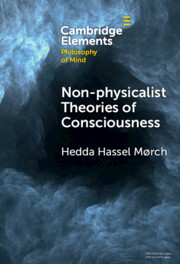Non-physicalist Theories of Consciousness
Is consciousness a purely physical phenomenon? Most contemporary philosophers and theorists hold that it is, and take this to be supported by modern science. But a significant minority endorse non-physicalist theories such as dualism, idealism and panpsychism, among other reasons because it may seem impossible to fully explain consciousness, or capture what it's like to be in conscious states (such as seeing red, or being in pain), in physical terms. This Element will introduce the main non-physicalist theories of consciousness and explain the most important arguments for them, and consider how they each respond to the scientific and other arguments in support of physicalism. This title is also available as Open Access on Cambridge Core.
Product details
January 2024Adobe eBook Reader
9781009317313
0 pages
This ISBN is for an eBook version which is distributed on our behalf by a third party.
Table of Contents
- Introduction:
- 1. Consciousness and physicalism
- 2. Dualism
- 3. Subjective idealism and phenomenalism
- 4. Dual-aspect monism (or panpsychism and panprotopsychism)
- Conclusion-with a word on mysterianism
- References.


